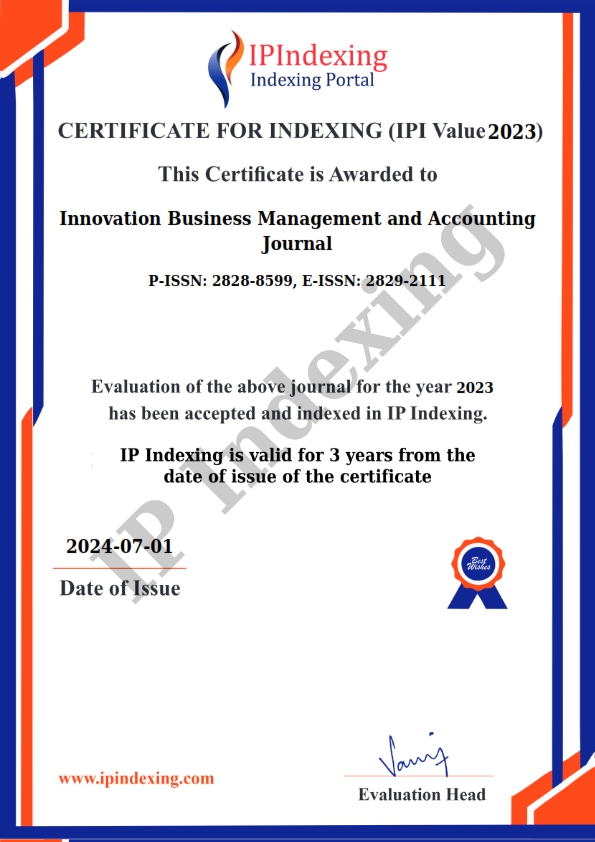The Influence of Corporate Social Responsibility and Profitability on Tax Avoidance
DOI:
https://doi.org/10.56070/ibmaj.2024.004Keywords:
Corporate Social Responsibility, Profitability, Tax AvoidanceAbstract
The urgency of the research is that there is new research on the factors influencing tax avoidance. Based on the literature or journal reference collection, this research has novelty compared to previous research, namely adding independent variables, changing the company object, and updating the research year. The type of research used is quantitative research. The population in the study were all manufacturing companies on the Indonesian Stock Exchange in 2017-2021. Data collection is a step-by-step process for compiling data according to the character and needs of the research. The data collection technique in this research is the documentation method. Documentation is done by reading and taking notes from books, research journals and internet downloads. This research will test the moderating effect of audit quality on the relationship between corporate social responsibility, profitability and tax avoidance variables. This method is completed using Moderated Regression Analysis (MRA). This research shows that the first regression model shows no significant influence between corporate social responsibility and partial tax avoidance. The first regression model shows a significant negative influence between profitability and partial tax avoidance.
Downloads
References
Aryatama, M. I., & Raharja, S. (2021). The Effect of Capital Intensity, Corporate Social Responsibility, and Profitability on Tax Avoidance (In Manufacturing Companies Industry of Food & Beverage Sub Sectors Listed on Indonesia Stock Exchange 2015-2020). Diponegoro Journal of Accounting, 10(4). Retrieved from https://ejournal3.undip.ac.id/index.php/accounting/article/view/33038
Col, B., & Patel, S. (2019). Going to haven? Corporate social responsibility and tax avoidance. Journal of Business Ethics, 154, 1033-1050. https://doi.org/10.1007/s10551-016-3393-2
Dewi, F. Y., & Astutie, Y. P. (2023). Pengaruh Komisaris Independen Koneksi Politik dan Profitabilitas Terhadap Penghindaran Pajak. JABKO:Jurnal Akuntansi Dan Bisnis Kontemporer, 3(2), 48-71. https://doi.org/10.24905/jabko.v13i2.41
Faradisty, A., Hariyani, E., & Wiguna, M. (2019). The effect of corporate social responsibility, profitability, independent commissioners, sales growth and capital intensity on tax avoidance. Journal of Contemporary Accounting, 1(3), 153-160. https://doi.org/10.20885/jca.vol1.iss3.art3
Gunawan A. S., & Sulistiawan, D. (2017). Pengaruh Sikap Machiavellianism Dan Social Responsibility Terhadap Perilaku Tax Avoidance Yang Dilakukan Oleh Wajib Pajak Di Indonesia (Jawa Tengah Dan Jawa Timur. Jurnal Ilmiah Mahasiswa Universitas Surabaya, 6(2), 1-12.
Khlif, H., & Achek, I. (2015). The determinants of tax evasion: a literature review. International Journal of Law and Management, 57(5), 486-497. https://doi.org/10.1108/IJLMA-03-2014-0027
Monika, C. M., & Noviari, N. (2021). The effects of financial distress, capital intensity, and audit quality on tax avoidance. American Journal of Humanities and Social Sciences Research, 6, 282-287.
Muller, A., & Kolk, A. (2015). Responsible tax as corporate social responsibility: The case of multinational enterprises and effective tax in India. Business & Society, 54(4), 435-463. https://doi.org/10.1177/000765031244998
Oats, L., & Tuck, P. (2019). Corporate tax avoidance: is tax transparency the solution?. Accounting and Business Research, 49(5), 565-583. https://doi.org/10.1080/00014788.2019.1611726
Palil, M. R. (2016). Issues, challenges and problems with tax evasion: The institutional factors approach. Gadjah Mada International Journal of Business, 18(2), 187-206. https://doi.org/10.3316/informit.363341383760497
Sekaran, U., & Bougie, R. (2016). Research methods for business: A skill building approach. John Wiley & Sons.
Sugiyono, & Lestari, P. (2021). Metode Penelitian Komunikasi. Alfabeta.
Wijaya, S., & Rahayu, F. D. (2021). Pengaruh Agresivitas Transfer Pricing, Penggunaan Negara Lindung Pajak, Dan Kepemilikan Institusional Terhadap Penghindaran Pajak. Jurnal Informasi, Perpajakan, Akuntansi, Dan Keuangan Publik, 16(2), 245-264. https://doi.org/10.25105/jipak.v16i2.9257
Downloads
Published
How to Cite
Issue
Section
License
Copyright (c) 2024 Nirsetyo Wahdi, Widji Astuti, Prihat Assih

This work is licensed under a Creative Commons Attribution-ShareAlike 4.0 International License.



